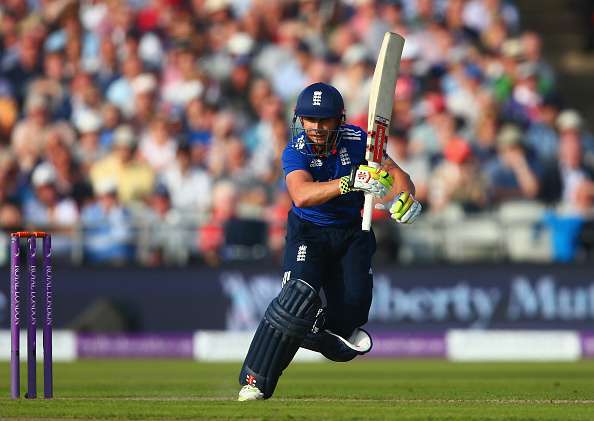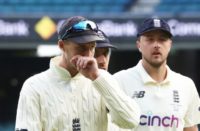I was on my way to Trent Bridge following up the promise of an interview when I heard the news about James Taylor. I’d bumped into him, quite by chance, in my home town of Ludlow a couple of weeks previously, when we’d shaken hands and exchanged our news and agreed to a face-to-face chat for The Cricket Paper.
He told me he was keen for the season to start and, while he didn’t actually spell it out, indicated he was also looking forward to the chance to reiterate his desire and ambition to carry on fighting for his future with England which, as often before, seemed in the balance.
Knowing he wasn’t playing in Nottinghamshire’s opening championship match against Surrey because of what had been described as a virus, I’d texted him on Tuesday morning to suggest we could meet at the ground.
I wasn’t unduly perturbed that he had not texted back to confirm as, knowing him, once he had undergone the routine tests he was due to take to determine the cause of his current illness, he would almost certainly be in his second home, the gym, and I’d catch him when he was good and ready.
And then the voice on the car radio announced: “James Taylor, the Nottinghamshire and England cricketer, has been forced to retire at the age of 26 due to a serious heart condition.”
Not James. Not the nicest kid in cricket. Not the fittest man in the England squad. Not the guy who’d been through so many disappointments, overcome such prejudice, worked so hard and had started to prove so many people wrong.
Too bloody unfair.
Trent Bridge was ghostly quiet and the people numb with shock.
Even the Nottinghamshire CCC flag flying above the dressing rooms was at half-mast, though it transpired this was to mark the passing of their former scorer, Brian Hews, aged 80, the day before.
But when Mick Newell, the club’s director of cricket and an England
selector, spoke of the future Taylor now faces, it had the effect of shaking us out of our dreary reverie because what he said was so spot-on. Responding to the suggestion that Taylor would need all the optimism and positivity with which he had countered so much pessimism and negativity in his international career, Newell concurred: “He was one of those players that had to score more runs in county cricket than others to get noticed.
“Having worked so hard – and you know how hard he has had to work – perhaps he was just establishing himself and it’s now been taken away from him.
“Obviously he’s devastated and his family are devastated for him but they’re telling him that quite often they (the doctors) don’t find out about this illness until it’s too late and they have found it.
“So I think the initial devastation of being told he’s not going to play cricket again has been tempered by how grateful he is to be alive, really. That’s probably why he’s perked up a little bit.”
Indeed he had, so much so that the next thing we saw from Taylor was a smiling selfie taken from his hospital bed as he lay waiting for an operation to fit the defibrillator which should help control, but not correct a condition called ARVC (Arrhythmogenic Right Ventricular Cardiomyopathy), but commonly known as a dicky ticker.
And there, in a couple of nutshells, is why Taylor’s tale is so affecting.
Newell and, later, the chairman of selectors James Whitaker emphasised the size of Taylor’s cricket brain, the intelligence that had already earned him the opportunity to captain England Lions and the ODI side against Ireland last summer.
With the 2017 ICC Champions Trophy and the 2019 World Cup approaching, they agreed he would have been a contender to replace Eoin Morgan in due course, maybe in T20 cricket as well.
Those who have always rated him reiterated their belief that his form in Test cricket first against Pakistan and in the victory by 241 runs over South Africa at Durban meant he had jammed his foot in the door to selection for the summer series against Sri Lanka and Pakistan, with his expertise against spin making him a near certainty for the winter action in India and Bangladesh. Graham Gooch reckoned he was a “shoo-in”.
Yet had he grasped all of the above, as many were convinced he now must, the size of the achievement would have been even more remarkable because of how much he’d done to earn his chance against the judgment of those who considered him not only technically suspect but just too short to be a real player.
It is not necessary to go into great detail again how one England colleague in particular made his thoughts on that subject crystal clear inside and outside the dressing room on the occasion of Taylor’s Test debut against South Africa at Headingley back in 2012.
But the fact that he was not picked to play this form of cricket for England in the more than three years that spanned the end of that series to the third Test of the 2015 winter series against Pakistan in Sharjah proves Kevin Pietersen was not alone in his opinion.
After a calendar year in which he made 861 runs in 19 completed ODI innings at an average of 45.31, including 90 against Sri Lanka, 98 not out against Australia in Melbourne and his first international ton, 101 against them at Old Trafford, and raised his career average to 42.24, Taylor might have thought he had finally secured a starting place in the 50-over side for the most recent series against the Proteas.
Once again, however, he found himself the odd man out, discarded, for the balance of the side, in favour of the returning Ben Stokes.
Even though the rejections were coated in sugar every time, not once did you hear Taylor bemoaning his fate.
Rather, he would take the hit, set himself to work harder, try harder, learn more, play better and make so many runs he could not be ignored.
If and when a chance did come again anyone wanting him out again would have to employ a team of wild horses.
Taylor once described how part of his motivation to succeed stemmed from the loss of his friend Henry Wilson, who accompanied him every step of his sporting education at Shrewsbury School but died ridiculously young when he slipped from a cliff face while at university in Scotland.
In the aftermath of the accident, Taylor made a promise to his friend, and to himself, to make the most of every moment, strive to overcome every obstacle placed in his way, to find a way.
He may not feel much like it now but when Taylor starts to try to come to terms with losing his career, he would do worse than remember that promise.
This piece originally featured in The Cricket Paper, Friday April 15 2016












